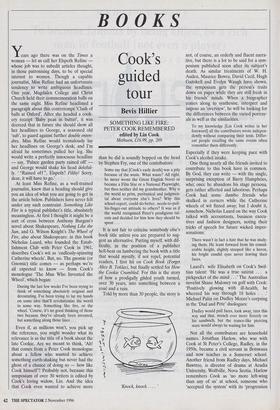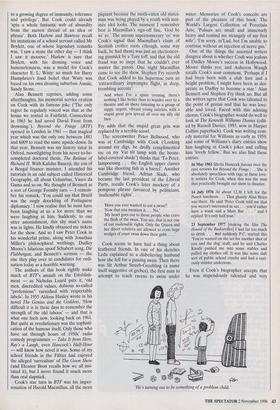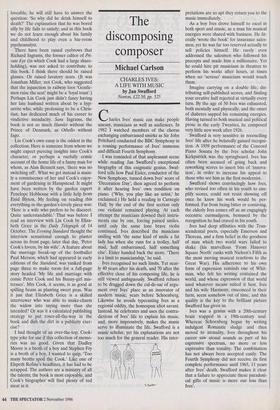BOOKS
Cook's guided tour
Bevis Hillier
SOMETHING LIKE FIRE: PETER COOK REMEMBERED edited by Lin Cook Methuen, £16.99, pp. 269 Years ago there was on the Times a woman — let us call her Elspeth Refine whose job was to subedit articles thought, in those patronising days, to be of special interest to women. Though a capable journalist, Miss Refine had an unfortunate tendency to write ambiguous headlines. One year, Magdalen College and Christ Church held their commemoration balls Son the same night. Miss Refine headlined a paragraph about this contretemps 'Clash of balls at Oxford'. After she headed a cook- ery receipt 'Baby peas in butter', it was decreed that in future she should show all her headlines to George, a seasoned old `sub', to guard against further double enten- dres. Miss Refine would tremulously lay her headlines on George's desk; and I'm afraid he sometimes pulled her leg. She would write a perfectly innocuous headline — say, 'Palace garden party rained off and George would shake his head doleful- ly. ' "Rained off ", Elspeth? Filthy! Sorry, dear, it will have to go.'
At least Miss Refine, as a well-trained journalist, knew that a heading should give you an idea of what you are going to get in the article below. Publishers have never felt under any such constraint. Something Like Fire is a typical publisher's title, absolutely meaningless. At first I thought it might be a sort of cross between Anthony Burgess's novel about Shakespeare, Nothing Like the Sun, and G. Wilson Knight's The Wheel of Fire, also about Shakespeare: in this book Nicholas Luard, who founded the Estab- lishment Club with Peter Cook in 1961, describes Cook's wit as 'endlessly-spinning Catherine wheels'. But, no. The gnomic (or Gnomic) title comes — as perhaps we're all expected to know — from Cook's monologue 'The Man Who Invented the Wheel', which began:
During the last few weeks I've been trying to think of something absolutely original and devastating. I've been trying to lay my hands on some idea that'll revolutionise the world in some way. Something like fire, or the wheel. 'Course, it's no good thinking of those two because they've already been invented, but something along those lines . . .
Even if, as millions won't, you pick up the reference, you might wonder what its relevance is as the title of a book about the late Cookie. Are we meant to think, `Ah! that comes from a Peter Cook monologue about a fellow who wanted to achieve something earth-shaking but never had the ghost of a chance of doing so — how like Cook himself'? Probably not, because this symposium of over 30 writers is edited by Cook's loving widow, Lin. And the idea that Cook even wanted to achieve more than he did is soundly bopped on the head by Stephen Fry, one of the contributors:
Some say that [Cook's early death] was a pity because of the waste. What waste? All right, he never wrote the Great English Novel or became a Film Star or a National Playwright, but then neither did my grandmother. Why is the world so prim, puritanical and judgmen- tal about everyone else's lives? Why this school-report, could-do-better, needs-to-pull- his-finger-out attitude to others? It was as if the world recognised Peter's prodigious tal- ents and decided for him how they should be spent ...
It is not fair to criticise somebody else's book title unless you are prepared to sug- gest an alternative. Putting myself, with dif- ficulty, in the position of a publisher hell-bent on lumbering the book with a title that would mystify, if not repel, potential readers, I first hit on Cook Book (Forget Alice B. Toklas), but finally settled for How the Cookie Crumbled. For this is the story of how a prodigally gilded youth turned, over 30 years, into something between a roué and a ruin.
Told by more than 30 people, the story is Knock, knock . . . ' not, of course, an orderly and fluent narra- tive, but there is a lot to be said for a sym- posium published soon after its subject's death. As similar treatments of W. H. Auden, Maurice Bowra, David Cecil, Hugh Gaitskell and Evelyn Waugh have shown, the symposium gets the person's traits down on paper while they are still fresh in his friends' minds. When a biographer comes along to synthesise, interpret and impose an 'overview', he will be looking for the differences between the varied portray- als as well as the similarities.
To my knowledge [Lin Cook writes in her foreword] all the contributors wrote indepen- dently without comparing their texts. Differ- ent people recalling the same events often remember them differently.
Especially if they were keeping pace with Cook's alcohol intake.
One thing nearly all the friends invited to contribute to this book have in common. By God, they can write — with the single, surprising exception of Barry Humphries, who, once he abandons his stage persona, gets rather affected and laborious. Perhaps Cook had some dumbo friends who skulked in corners while the Catherine wheels of wit fizzed away; but I doubt it, somehow. Nicholas Luard on the way Cook talked with accountants, business execu- tives and fashion designers, noting their tricks of speech for future wicked imper- sonations:
There wasn't in fact a hint that he was study- ing them. He leant forward from his consid- erable height, slightly stooped like a heron, his bright candid eyes never leaving their faces.
Luard's wife Elisabeth on Cook's Swif- tian talent: 'He was a true satirist . . . a pickpocket of the mind . . .' The Australian novelist Shane Maloney on golf with Cook: `Positively glowing with ill-health, he wheezed his way through 18 holes . . Michael Palin on Dudley Moore's corpsing in the 'Dud and Pete' duologues:
Dudley would pull faces, look away, turn this way and that, munch ever more fiercely on his sandwich, but the trance-like piercing stare would always be waiting for him.
Not all the contributors are household names. Jonathan Harlow, who was with Cook at St Peter's College, Radley, in the 1950s, became a civil servant in Botswana and now teaches in a Somerset school. Another friend from Radley days, Michael Bawtree, is director of drama at Acadia University, Wolfville, Nova Scotia. Harlow remembers Cook as 'no more left-wing than any of us' at school, someone who `accepted the system' with its 'progression to a growing degree of immunity, tolerance and privilege'. But Cook could already `spin a whole fantastic web of absurdity from the merest thread of an idea or phrase'. Both Harlow and Bawtree recall his imitations of a school servant called Mr Boylett, one of whose legendary remarks was, 'I saw a stone the other day — I think I saw it m000ve.' Harlow is sure that Boylett, with his droning voice and humourlessness, was a model for Cook's character E. L. Wisty: so much for Barry Humphries's fond belief that Wisty was based on his own droning suburban Aussie, Sandy Stone.
Alan Bennett reprises, adding some afterthoughts, his memorial service oration on Cook with its famous joke (The only regret he regularly voiced was that at the house we rented in Fairfield, Connecticut in 1963 he had saved David Frost from drowning.'). Beyond the Fringe (BTF) opened in London in 1961 — that magical year which was the only one between 1881 and 6009 to read the same upside-down. In that year, Bennett was my history tutor in Oxford, moonlighting from his never-to-be- completed doctoral thesis, The Retinue of Richard II. With Kalidas Banerji, the son of a Bengal finance minister, I attended his tutorials in an odd subject called Historical Geography, all about Columbus, Vasco da Gama and so on. We thought of Bennett as a sort of George Formby turn — I remem- ber his remark, 'You could say that Brazil was the oogly doockling of Portuguese diplomacy.' I now realise that he must have been laughing at us a lot more than we were laughing at him. Suddenly, to our utter astonishment, this shy man's name was in lights. He kindly obtained me tickets for the show. And so I saw Peter Cook in his wonderful prime, along with Jonathan Miller's philosophical writhings, Dudley Moore's hilarious spoof Schubert song, Die Flabbergast, and Bennett's sermon — the one they play over to candidates for ordi- nation today as a horrible warning.
The authors of this book rightly make much of BTF's assault on the Establish- ment — as Nicholas Luard puts it, 'old men, discredited values, dubious so-called "professions" varnished with respectable labels'. In 1955 Aldous Huxley wrote in his novel The Genius and the Goddess, 'How difficult it is in these days to remember the strength of the old taboos' — and that is what one feels now, looking back on 1961. But quite as revolutionary was the sophisti- cation of the humour itself. Only those who have sat through hours of 1950s' radio comedy programmes — Take It from Here, Ray's a Laugh, even Hancock's Half-Hour — will know how novel it was. Some of my school friends in the Fifties had enjoyed the alleged 'surrealism' of The Goon Show (and Eleanor Bron recalls how we all imi- tated it), but I never found it much more than oral slapstick.
Cook's star turn in BTF was his imper- sonation of Harold Macmillan, all the more piquant because the moth-eaten old states- man was being played by a youth with mat- inee idol looks. The moment I remember best is Macmillan's sign-off line, 'God be wi' ye.' The uneasy supernumerary 'ee' was Cook's signal that Macmillan's claim of Scottish crofter roots (though, some way back, he had them) was just an electioneer- ing gimmick by a Tory toff, and that the old fraud was so inept that he couldn't ever master the patois. One night Macmillan came to see the show. Stephen Fry records that Cook added to his Supermac turn an `extraordinary impromptu flight, in deep, trembling accents':
And when I've a spare evening, there's nothing I like better than to wander over to a theatre and sit there listening to a group of sappy, urgent, vibrant young satirists, with a stupid great grin spread all over my silly old face.
Fry adds that the stupid great grin was replaced by a terrible scowl.
The screenwriter Peter Bellwood, who was at Cambridge with Cook (`Looking around my digs, he drolly complimented me on my Vat 69 lamp with the booze- label-covered shade') thinks that `To Peter, lampooning . . the English upper classes was like shooting fish in a barrel'. Another Cambridge friend, Adrian Slade, who became the last president of the Liberal Party, recalls Cook's later mockery of a pompous phrase favoured by politicians, `inalienable rights'.
`Have you ever wanted to eat a swan?' `Now that you mention it. . . No.'
`My heart goes out to those people who crave the flesh of the swan. You see, that is not one of our inalienable rights. Only the Queen and her direct relatives are allowed to cram huge wodges of roast swan down their gobs ....'
Cook seems to have had a thing about feathered friends. In one of his sketches Leda explained to a disbelieving husband how she fell for a passing swan. Then there was Sir Arthur Streeb-Greebling (a name itself suggestive of grebes), the first man to attempt to teach ravens to swim under water. Memories of Cook's conceits are part of the pleasure of this book: The World's Largest Collection of Porcelain Arts; 'Pulsars are small and immensely heavy and remind me strangely of my first wife'; 'I'm sorry, m'Lud, but I'm unable to continue without an injection of nerve gas.'
One of the things the assorted writers disagree about is whether Cook was jealous of Dudley Moore's success in Hollywood. Moore thinks yes; and Auberon Waugh recalls Cook's sour comment, 'Perhaps if I had been born with a club foot and a height problem, I might have been as des- perate as Dudley to become a star.' Alan Bennett and Stephen Fry think no. But all the writers agree that Cook was talented to the point of genius and that he was love- able and loved. Faced with this adoring chorus, Cook's biographer would do well to look at The Kenneth Williams Diaries (edit- ed by Russell Davies, 1993, now in Harper Collins paperback). Cook was writing com- edy material for Williams as early as 1959; and some of Williams's diary entries show him laughing at Cook's jokes and calling him 'lovely fellow.' But we also find these entries: 16 May 1961 Sheila Hancock furious over the rave reviews for Beyond the Fringe . . . She is absolutely speechless with rage at these love- ly notices for Cook, when this was the man that practically brought our show to disaster.
14 July 1976 At about 12.30 I left for the Punch luncheon . . . That ghastly Alan Brien was there. He said 'Peter Cook told me that you weren't interested in sex . .. you'd rather have a wank and a Mars Bar . . . ' and I replied 'It's only half true.'
23 September 1977 [making the film The Hound of the Baskervilles] I had far too much to drink . . . ernd suddenly P.C. started this `You're wanted on the set for another shot of you and the dog' stuff, and he and Charles Knode pushed me into some stables and pulled my clothes off. It was like some daft sort of public school cruelty and had a curi- ously sinister undertone.
Even if Cook's biographer accepts that he was stupendously talented and very He's turning out to be something of a problem child.' loveable, he will still have to answer the question: `So why did he drink himself to death?' The explanation that he was bored silly by life fails to satisfy; and in this book we do not learn enough about his family and childhood to play even a bar-room psychoanalyst.
There have been raised eyebrows that Richard Ingrams, the former editor of Pri- vate Eye (in which Cook had a large share- holding), was not asked to contribute to this book. I think there should be raised glasses. Or raised lavatory seats. (It was Jonathan Miller, not Cook, who suggested that the injunction in railway loos 'Gentle- men raise the seat' might be a 'loyal toast'.) Perhaps Lin Cook just didn't fancy having her late husband written about by a hyp ocrite who, while professing to be a Chris- tian, has dedicated much of his career to vindictive mendacity. Sans Ingrams, the book is not so much Hamlet without the Prince of Denmark, as Othello without Iago.
Lin Cook's own essay is the oddest in the collection. Here is someone from whom we might expect piercing insights into Cook's character, or perhaps a ruefully comic account of the home life of a funny man for whom, as Alan Bennett says, 'there was no switching off. What we get instead is main- ly a reminiscence of her and Cook's enjoy- ment of gardening in Hampstead. It might have been written by the garden expert Penelope Hobhouse with a little help from Enid Blyton. My feeling on reading this everything-in-the-garden's-lovely piece was: `Here is a wife who prefers to be discreet. Quite understandable.' That was before I read an interview with Lin Cook by Eliza- beth Grice in the Daily Telegraph of 14 October. The Evening Standard thought the interview sensational enough to plaster across its front page, later that day, 'Peter Cook's lovers, by his wife'. A feature about the marriage break—up of the footballer Paul Merson, which had appeared in early editions of the Standard, was yanked from page three to make room for a full-page story headed 'My life and marriage with comic Peter Cook and his Bunny-girl mis- tresses'. Mrs Cook, it seems, is as good at spilling beans as planting sweet peas. Was it just that Elizabeth Grice is a skilled interviewer who was able to snake-charm the widow into saying more than she intended? Or was it a calculated publishing strategy to put roses-all-the-way in the book and dish the dirt in a publicity exer- cise?
I had thought of an over-the-top, Cook- type joke for use if this collection of memo- ries was no good. Given that Dudley Moore is a broth of a boy and Stephen Fry is a broth of a boy, I wanted to quip, 'Too many broths spoil the Cook.' Like one of Elspeth Refine's headlines, it has had to be scrapped. The authors are a ministry of all the talents; the book is most enjoyable, and Cook's biographer will find plenty of red meat in it.




















































































 Previous page
Previous page